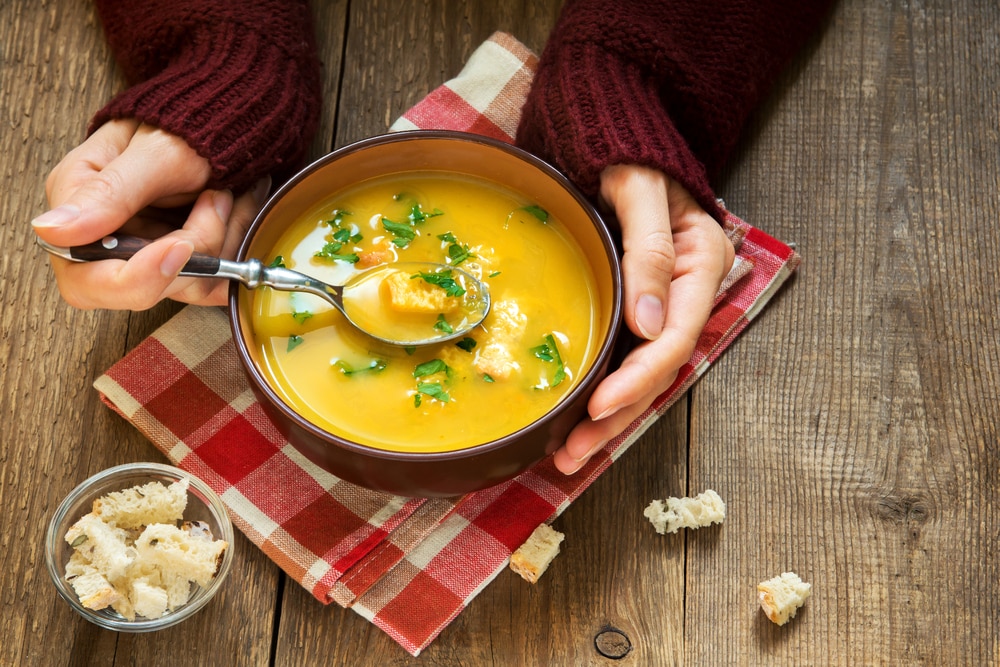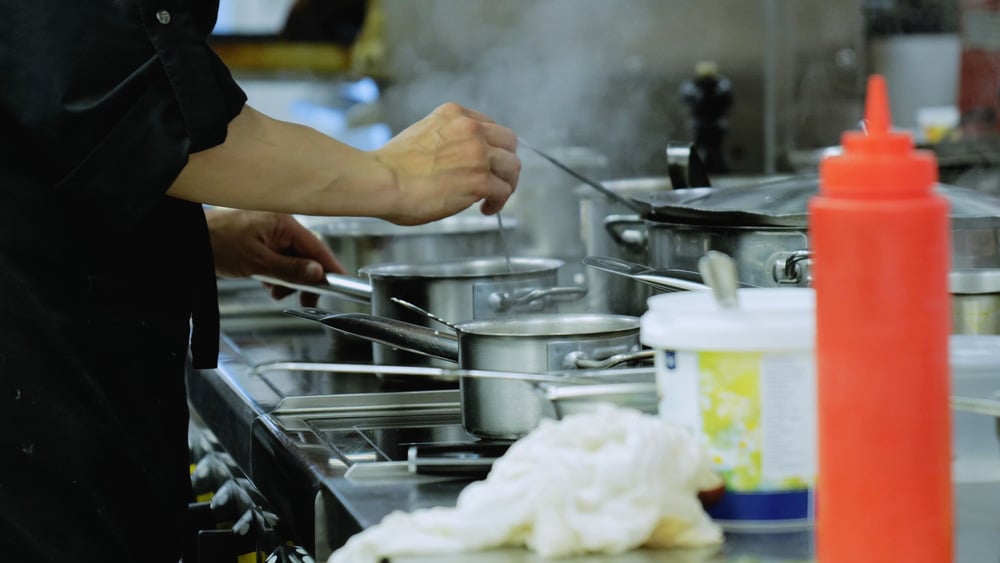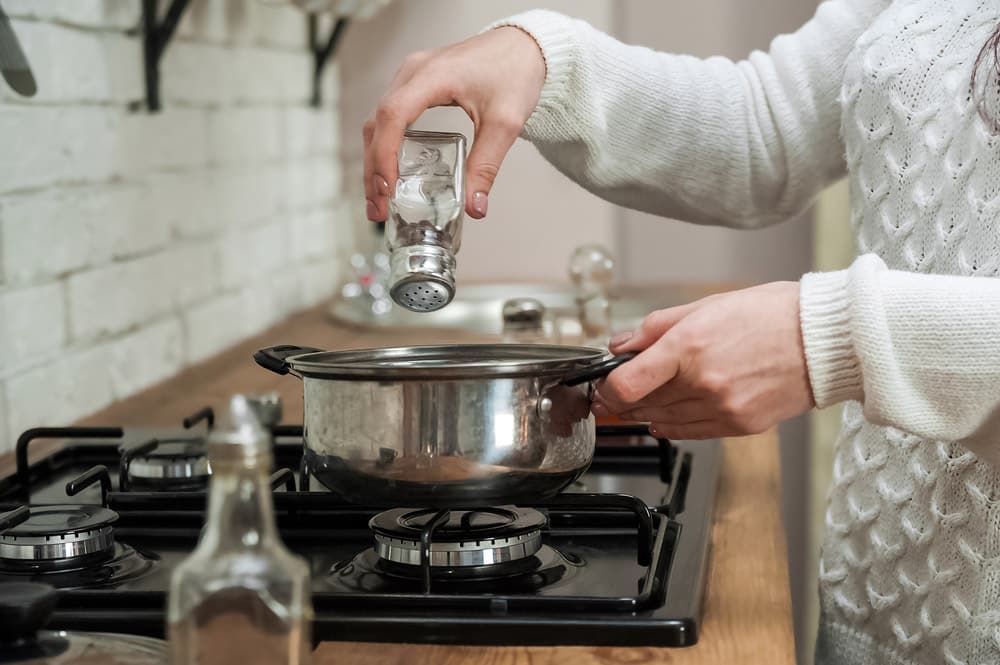
There are so many wonderful soups made today simply by adding to the mixture things such as macaroni and spaghetti, bones, and trimmings of meat. You can also add vegetables and various meats.
What could be tastier than a bowl of piping-hot cream soup served with hot bread rolls? Certainly, a home-made soup that is lacking in strength or flavor can be improved by the addition of some of the different meat or vegetable extracts available.
But what if your soup tastes like metal? Can such a dreadful flavor be disguised by some other ingredient? What makes soup taste like metal in the first place. Is it just canned soup that can taste like metal, or could home-made soup also suffer the same fate?
Why Does My Soup Taste Like Metal
Let’s look at some possible reasons why your soup could taste like metal –
Medical issues
When it’s just you complaining about your soup tasting like metal and everybody else is raving about the taste of the soup, the problem could be a medical issue with you. There are some medical conditions as well as medications that can alter one’s taste.
Head injuries are known to cause a person to have a metallic taste in their mouth, as do sinus infections. People complain of their food having a metal or blood taste.
If it’s only you complaining of the soup tasting like metal, it might be a wise move to have yourself checked over by a medical doctor.
Canned food is nearly always found in a kitchen pantry. Canned food is cheaper than fresh foods, it’s super convenient, and it has a long shelf life. The downside of canned soup is that the tin can expose you to BPA and a metal-tasting soup.
BPA has always been used in the resin-based linings of canned foods. Foods stored in cans, such as soup, can eat away at the aluminum, creating the chance for bacteria to enter. Uncoated cans will impart a metallic flavor to your soup.
Food experts and medical professionals always advise you to choose frozen over canned. Avoiding canned soups and other foods is your most effective way to reduce your BPA exposure and your chances of consuming metal tasting soups and other foods.
You’re using metallic cookware
You have to be careful with the use of metal cookware. It has the ability to leach while you cook. This metal leaching occurs when metal pits during the cooking process, most often with acidic foods.
Metals such as aluminum, cast iron, and copper are prone to corrosion, and when this occurs, bits of metal break off and can enter your cooked food. This is what gives your food a metallic flavor.
Aluminum does this, but having said that, aluminum cookware is made to be pretty safe these days. The solution is to simply avoid using cheap aluminum cookware and avoid eating acidic foods with aluminum.
- Stainless steel – the safest cookware
Stainless steel pans are the safest kind of cookware, as they are the least reactive. But then again, stainless steel quality also varies, and you want to avoid the very cheap pots and pans.
Cooking experts will also tell you that an easy way to prevent a metallic taste in your soup is to always make sure your cookware is 100% clean. You also want to make sure that the pot doesn’t have deep scratches, as this can lead to a metallic taste in your soup.
When cleaning your cookware, you need to be careful with surface scratches, even with stainless steel pots and pans. They may well be stain-resistant, but even stainless steel cookware can get scratched and then release certain metal components.
If food does get stuck to the bottom of a pot, don’t scratch at the food with a metal spoon. Rather, you should place your pot in hot, soapy water to soften the food so that it comes off easily with a wooden spoon later on.
It’s always best to wash your cookware with mild dish detergent and a soft sponge or cloth. Using abrasive products will increase the risk of scratching pot and pan surfaces.
You don’t have quality cookware
It’s not possible for everyone to have the best, most expensive cookware. Some people do the best they can with cheaper pots. But where possible, if your finances allow, and if you want to avoid tasting metal in your soup and other foods, buy top quality cookware.
Most cookware has a fair amount of chromium and nickel. Pots and pans with a high nickel percentage are less reactive and produce far less of a metal taste.
If stainless steel cookware has a low percentage of nickel, it can react with acid ingredients. It is this that results in pitting or corrosion, opening the cookware to leaching metal into the food.
You’re using acidic ingredients
Many soups have a selection of vegetables in them. Some of these vegetables are naturally acidic, and the acid taste is increased when heated. Also, the longer you leave food in your pot, the more time it has to react with the metal.
Leaving leftover food in a pot will continue to react and quite likely affect further cooking. Tomatoes have a high acidity level, which increases when heated. Other vegetables, such as cabbage, and even some aromatic herbs can give your soup a metallic taste.
Also, as already suggested, when acidic ingredients are cooked in reactive pans, small amounts of molecules from the metal can leach into the food. These small amounts may not be harmful to ingest, but they can give off unpleasant metallic flavors.
You want to always avoid reactive cookware when cooking acidic foods. Chefs will tell you that one of the tricks they use to eliminate the metal taste in your soup is to add a small pinch of baking soda. It can neutralize the acidity of the soup.
Conclusion:
The enjoyment of a hearty soup can’t be denied. Don’t be too disappointed if a wonderful soup recipe ends up tasting like metal. There could be a few reasons for this, but it’s something that can be solved.
We’ve provided some tips on what could be causing your soup to taste like metal and what you can do to avoid it. Soups are appetizing, and they aid in proper digestion of the main meal afterwards. A good soup’s sight, smell, and taste will stimulate the digestive process.
You can avoid making soup with a metal taste and you can be rewarded with everybody’s empty bowl and one or two people asking, “Please, may I have some more?”



